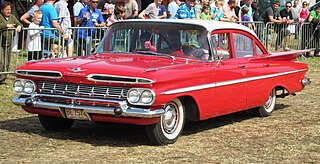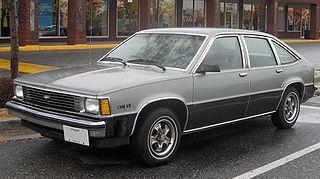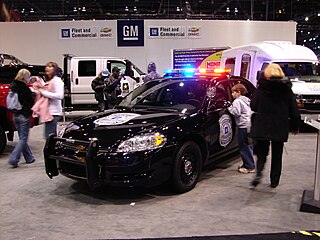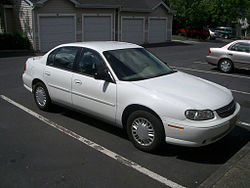
Chevrolet, colloquially referred to as Chevy, is an American automobile division of the manufacturer General Motors (GM).

The Chevrolet Impala is a full-size car that was built by Chevrolet for model years 1958 to 1985, 1994 to 1996, and 2000 to 2020. The Impala was Chevrolet's popular flagship passenger car and was among the better-selling American-made automobiles in the United States.

The Chevrolet Chevelle is a mid-sized automobile that was produced by Chevrolet in three generations for the 1964 through 1977 model years. Part of the General Motors (GM) A-body platform, the Chevelle was one of Chevrolet's most successful nameplates. Body styles included coupes, sedans, convertibles, and station wagons. The "Super Sport" versions were produced through the 1973 model year and Lagunas from 1973 through to 1976.

The Chevrolet Biscayne was a series of full-size cars produced by the American manufacturer General Motors through its Chevrolet division between 1958 and 1975. Named after a show car displayed at the 1955 General Motors Motorama, the Biscayne was the least expensive model in the Chevrolet full-size car range. The absence of most exterior and fancy interior trimmings remained through the life of the series, as the slightly costlier Chevrolet Bel Air offered more interior and exterior features at a price significantly lower than the top-of-the-line Impala and Caprice.

The Chevrolet Lumina is a mid-size car that was produced and marketed by the Chevrolet division of General Motors from 1989 until 2001.

The Chevrolet Citation is a range of compact cars that was produced by the Chevrolet division of General Motors. The first Chevrolet sold with front-wheel drive, a single generation of the Citation was sold from the 1980 to 1985 model years. The successor of the Chevrolet Nova, the Citation was initially slotted between the Chevrolet Monza and the Chevrolet Malibu in the Chevrolet product line, later replaced by the Chevrolet Cavalier and the Chevrolet Celebrity.

The W-platform was a General Motors automotive platform underpinning both mid size and full-size front-wheel drive cars — across the platform's three generations from 1987-2016.

The Chevrolet Malibu is a mid-size car manufactured and marketed by Chevrolet from model years 1964–1983 and since 1997. The Malibu began as a trim-level of the Chevrolet Chevelle, becoming its own model line in 1978. Originally a rear-wheel drive intermediate, GM revived the Malibu nameplate as a front-wheel-drive car in 1997.

The General Motors N platform was a front-wheel drive compact automotive platform produced from 1984 to 2005. The GM N platform was based on the GM J-Body and replaced the GM X platform.
Enterprise Rent-A-Car is an American car rental agency headquartered in Clayton, Missouri, in Greater St. Louis. Enterprise is the flagship brand of Enterprise Holdings, which also owns other agencies including Alamo Rent a Car and National Car Rental. The company has historically concentrated on what it calls "home city" rentals, often people renting a car while their own was being repaired, but has expanded to airport-based rentals, especially after its parent company's acquisition of Alamo and National in 2007.

Super Sport, or SS, is the signature performance option package offered by Chevrolet on a limited number of its vehicles. All SS models come with distinctive "SS" markings on their exterior. The SS package was first made available for the 1961 Impala. Some of the other models bearing the SS badge include the Camaro, Chevelle, El Camino, Impala, Monte Carlo, Nova and Chevrolet Pickup Trucks. Current SS models are produced by the GM Performance Division.
A fleet special is a term applied to an automobile that is produced by a manufacturer with the express intent of it being sold in large volumes to corporate interests for business purposes rather than to consumers for personal use.

The Daewoo Magnus is a mid-sized sedan developed and manufactured by Daewoo for model years 2000-2006 under a single generation, and marketed globably by GM Daewoo and other General Motors divisions, as well as GMDAT stake holder Suzuki. Developed under its internal Daewoo designation V200, the Magnus was marketed prominently in the United States as the Suzuki Verona.

The Ford LTD II is an automobile produced and marketed by Ford Motor Company between 1977 and 1979 in the United States and Canada. Deriving its name from the full-sized Ford LTD model line, the intermediate LTD II consolidated the Ford Torino and Gran Torino model lines, with the Ford Elite replaced by the Ford Thunderbird. Offered in a two-door sedan, four-door sedan, and station wagon, the LTD II also served as a basis for the final generation of the Ford Ranchero coupe utility.

9C1 is a production code used by Chevrolet to designate a vehicle intended for use as a police car or car-based emergency vehicle. In marketing, these vehicles are sometimes named Police Pursuit Vehicle or Police Patrol Vehicle (PPV). The 9C1 package is intended to compete with the Ford Police Interceptor and Stellantis's Dodge Charger Pursuit and Dodge Durango Pursuit.
General Motors New Zealand Limited, is a subsidiary of General Motors that distributes GM' motor vehicles, engines, components and parts in New Zealand.

The fifth generation of the Chevrolet Impala is a line of full-size cars produced by Chevrolet from the 1971 to 1976 model years. The largest generation of the model line, the fifth-generation Impala grew to a 121.5-inch wheelbase
MyLink a.k.a. Intellilink is a telematics system/infotainment system offered by General Motors in their vehicles. The system was debuted in 2011 in the then-new Chevrolet Volt.

Maven was a car sharing service launched by General Motors (GM) in 2016. It provided services such as carsharing and peer-to-peer car sharing for personal use and also rented to drivers of gig economy professions such as Uber and Lyft. It operated in select cities in the United States, Canada and Australia until ceasing operations in 2020.
















